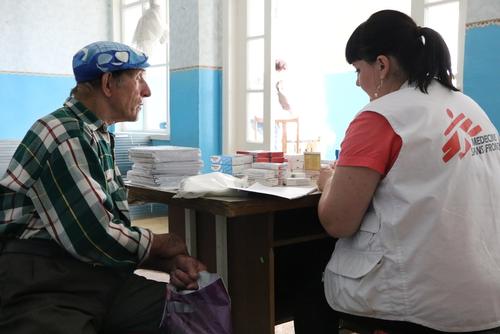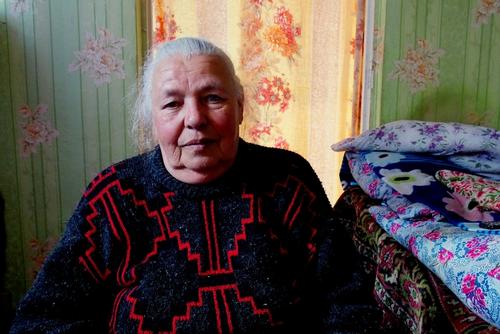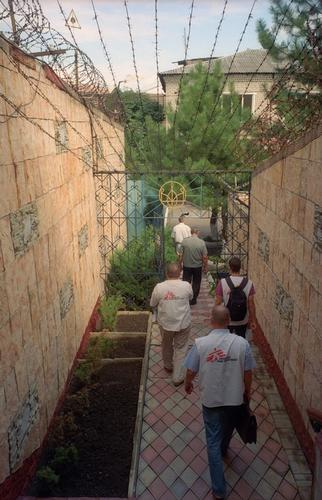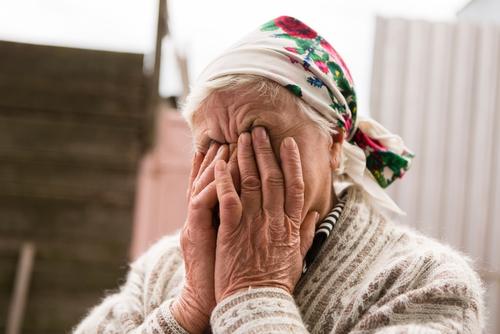MSF concludes medical humanitarian activities in Bakhmut area and hands over mobile clinic and checkpoint activities to Première Urgence Internationale and Médecins du Monde.
Bakhmut – Médecins Sans Frontières (MSF) is concluding its activities in Bakhmut areas today – covering locations in northern parts of Luhansk and Donetsk regions. MSF has been assisting people affected by the conflict in these locations since May 2014, providing direct support to more than 40,000 residents and 10,000 displaced people.
In the 40 locations located in Bakhmut and surrounding areas that MSF’s team has visited for the past two years, the organization has provided medical consultations for more than 20,000 patients and helped more than 12,500 people at the Mayorsk and Zaitseve checkpoints with first aid. MSF mental health teams have provided psychological support to more than 12,000 people in groups, trainings and individual sessions, including assistance in schools for children suffering from psychological trauma caused by the conflict. In addition, MSF supported more than 100 medical structures with the donation of medical supplies, mass casualty incidence training in eight hospitals and the rehabilitation of Svetlordarsk hospital’s laundry area, part of the hygiene and infection control management.
“People living in this area have been deeply affected by the conflict, especially elderly people. Some infrastructure was severely damaged, including our hospital, which was hit by shelling,” explains Dr. Gurgiy Ginadi Alexandrovitch, Head Doctor of Svetlodarsk hospital. “The support we received from MSF, including the rehabilitation work and the donations of medical supplies, has been essential for us to provide local communities with the medical care they needed during the most critical times.”
During the most intense periods of the conflict in 2014 and 2015, MSF provided support to people directly affected by the conflict on the both sides of the contact line, through donations of medical supplies to hospitals as well as donations of essential household items and mental health support to people who had fled their homes. In February 2015, MSF launched its first mobile clinics in order to provide primary health care and psychological support to displaced people, and soon after expanded to the most vulnerable individuals living near the contact line. In July 2015, seeing the kilometres long queue and alarmed by the fact that people were waiting for hours in the summer heat, MSF began running a first aid and water points at the Artemovsk-Gorlovka checkpoint in order to assist people who are waiting to pass to the other side of the frontline. In December 2015 MSF opened a first aid point and six toilets at the Mayorsk checkpoint.
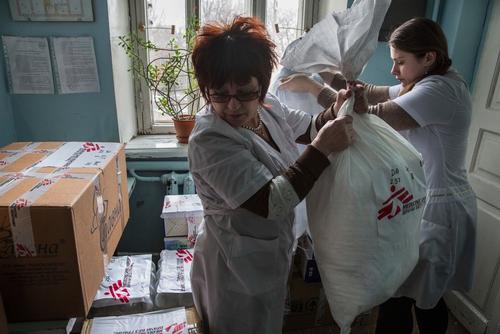
“As an emergency medical organisation and after two years of much needed support to the community and health facilities, MSF has seen that the capacity of the local health system in some areas of the northern parts of Luhansk and Donetsk regions has improved and people are again able to receive the necessary care. Where this is not possible yet, MSF has donated additional medical supplies to health facilities and handed over its activities, together with equipment and supplies, to the international organisations Première Urgence Internationale and Médecins du Monde that will continue to provide assistance in the coming months.” says Mr. Samuel Theodore, Head of Mission for MSF in Ukraine.
MSF will continue its primary health care and mental health services as well as donations of medications and medical equipment in the southern part of Donetsk region, in particular from Mariupol and Kurakhove. Since March 2015, MSF has assisted more than 32,000 people in these areas with medical and humanitarian aid, covering 25 locations.
In addition, MSF is continuing its drug-resistant tuberculosis project in the penitentiary system in Dnepropetrovsk, Mariupol and Bakhmut, and also has a coordination office in Kiev.
MSF remains ready to provide assistance in response to emergency humanitarian and medical needs in Ukraine.
MSF is an international medical - humanitarian organization, operating in more than 60 countries. The organization has been responding to the crisis in eastern Ukraine since May 2014.
In 2015, MSF donated medicines and medical equipment to more than 350 health facilities on both sides of the frontline, enabling over 9,900 patients with conflict-related injuries, more than 61,000 with chronic diseases to be treated, and 5,100 women to have assisted deliveries. Teams also carried out around 159,900 basic healthcare consultations and 12,000 mental health consultations in cooperation with the Ministry of Health.
MSF is an international non-governmental humanitarian organization dedicated to providing free humanitarian and medical assistance to victims of conflict, natural disasters, epidemics or people excluded from the health care system. MSF does not take sides in any conflict, is independent of all political, military and corporate agenda, and provides medical care to people on the basis of need alone, regardless of gender, race, religion or political affiliation.



